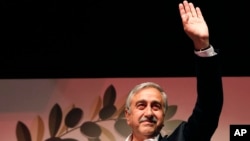Greek Cypriots welcomed the election of a moderate Turkish Cypriot leader in northern Cyprus on Monday, saying they anticipated a swift resumption of stalled peace talks.
Turkish Cypriot independent Mustafa Akinci swept to victory in presidential elections on Sunday, clinching 60.5 percent of the vote over incumbent conservative Dervis Eroglu. Akinci has pledged to push for a peace deal with Greek Cypriots.
"At last, our hopes are high that this country can be reunified," said Cypriot President Nicos Anastasiades.
As the Greek Cypriot community leader in talks overseen by the United Nations, Anastasiades will be Akinci's negotiating partner if and when the peace process resumes.
But Akinci quickly found himself in hot water with Turkish President Tayyip Erdogan, who rounded on him for suggesting relations with Turkey should be put on a more equal footing.
"Who's the one fighting for northern Cyprus in the international community? Does Mr. Akinci believe he can put up this fight on his own?" Erdogan said. "We will continue to view them like a mother looks at its child," he told a news conference in Ankara.
Cyprus was split in a Turkish invasion in 1974 triggered by a brief Greek-inspired coup. The Greek Cypriot-controlled south represents the whole island in the European Union, though membership is in political limbo in the north, a breakaway Turkish Cypriot state.
While any form of communication between Greek and Turkish Cypriots was severed for years, Akinci was an exception. As mayor of the ethnically split Cypriot capital Nicosia in the 1980s, he and his Greek Cypriot counterpart Lellos Demetriades worked on devising a master plan for the medieval city, encased in Venetian walls, with the idea that it should be reunited.
The city is still split by a U.N.-controlled buffer zone - a corridor of crumbling mansions, shops and homes abandoned in fighting.
Though welcoming Akinci's election, Greek Cypriots say any Cyprus settlement is contingent on Turkey, which bankrolls Turkish Cypriots and has some 30,000 troops in the heavily militarized, breakaway state.
Peace talks were halted last October after Greek Cypriots suspended their participation over a row with Turkey about offshore hydrocarbons exploration. Cyprus discovered gas offshore in late 2011 but Turkey disputes its rights and had dispatched an exploration vessel to carry out seismic research in Cypriot-claimed waters late last year.
The United Nations said its envoy, former Norwegian foreign minister Espen Barth Eide, would be in Cyprus in early May to prepare for a resumption of peace talks.





